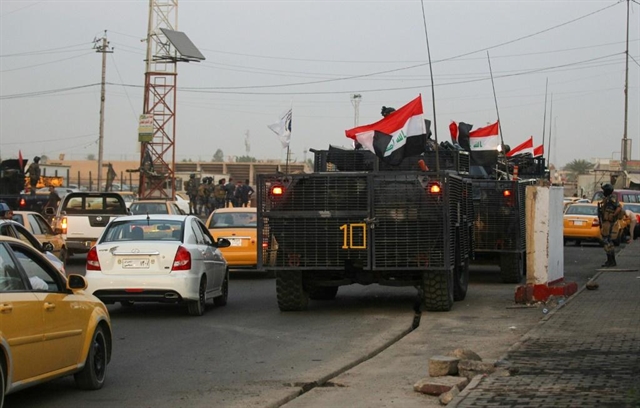 World
World


|
| The Iraqi government ordered the military to pull out of Sadr City a densely populated part of the capital where an overnight rally deteriorated into clashes that left 13 people dead according to medics and security sources. — AFP/VNA Photo |
BAGHDAD — Iraq's president called on Monday for a "halt to escalation" after widespread protests that killed dozens, including an overnight rally in east Baghdad in which the military admitted using "excessive force".
Demonstrations have rocked the capital and Iraq's southern provinces since Tuesday, first demanding reforms to fight corruption and unemployment but ramping up to calls for a total overhaul of the country's political system.
In a televised address, President Barham Saleh appealed for a "halt to escalation" and proposed a "national, all-encompassing and frank dialogue... without foreign interference" to chart a way out of the crisis.
"There is no legitimacy to any political process or system that does not work to achieve your demands," Saleh said, addressing protesters.
The demonstrations are unprecedented in Iraq because of their apparent spontaneity and independence in a deeply politicised society.
But they have also been exceptionally deadly with more than 100 people killed and 6,000 wounded since Tuesday.
Witnesses have reported that security forces used tear gas and live rounds while authorities accused "unidentified snipers" of shooting at protesters and the police.
Saleh said those who attacked demonstrators and security forces were "enemies of the people" and denounced weekend raids on local and regional media stations.
His statement came hours after Iraq's military admitted using "excessive force outside the rules of engagement" against a protest in the east Baghdad district of Sadr City.
An overnight rally there deteriorated into clashes that left 13 people dead, according to medics and security sources.
In videos distributed on social media, protesters could be seen ducking into streets littered with burning tyres as volleys of gunfire and suspected heavy weapons were heard.
But by Monday evening, in line with government orders, the military had been pulled out of Sadr City and a few police officers could be seen on the edges of the neighbourhood, an AFP photographer there said.
'Accountability'
Monday's statement was the first time security forces acknowledged using disproportionate measures, a step cautiously welcomed by Amnesty International.
"The security forces' admission of using excessive force is a first step that must be translated on the ground, to rein in the behaviour of security forces and the army," it said in Arabic.
"The next step is accountability."
The International Committee of the Red Cross on Monday urged for Iraqi health workers to be allowed to treat the wounded safely.
"The alternative is unthinkable for a population already weary and in need," said Katharina Ritz, ICRC's head of delegation in Iraq.
Sadr City, a densely populated, impoverished part of the capital, is a bastion of firebrand cleric Moqtada Sadr who has thrown his weight behind the protests by calling on Prime Minister Adel Abdel Mahdi's government to resign. — AFP